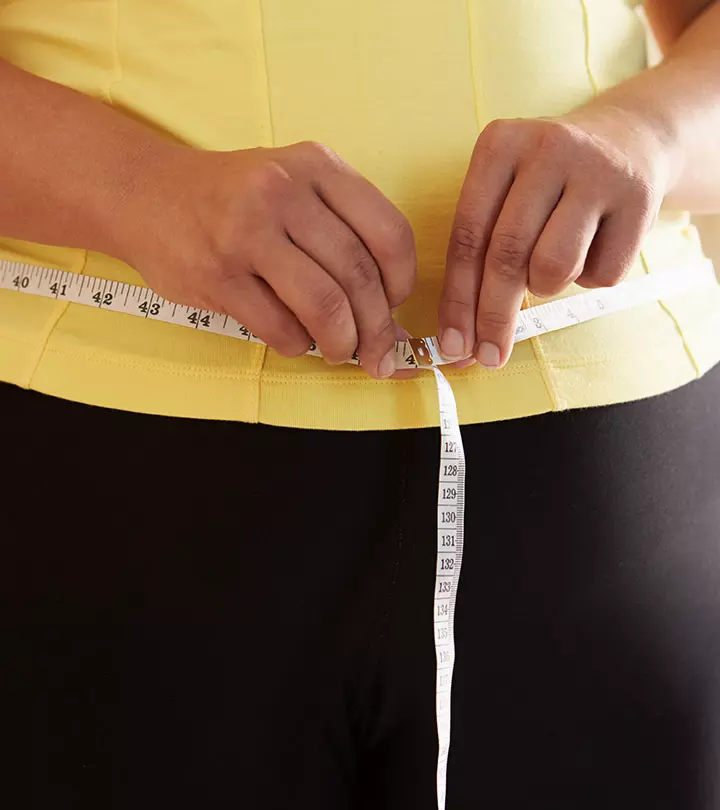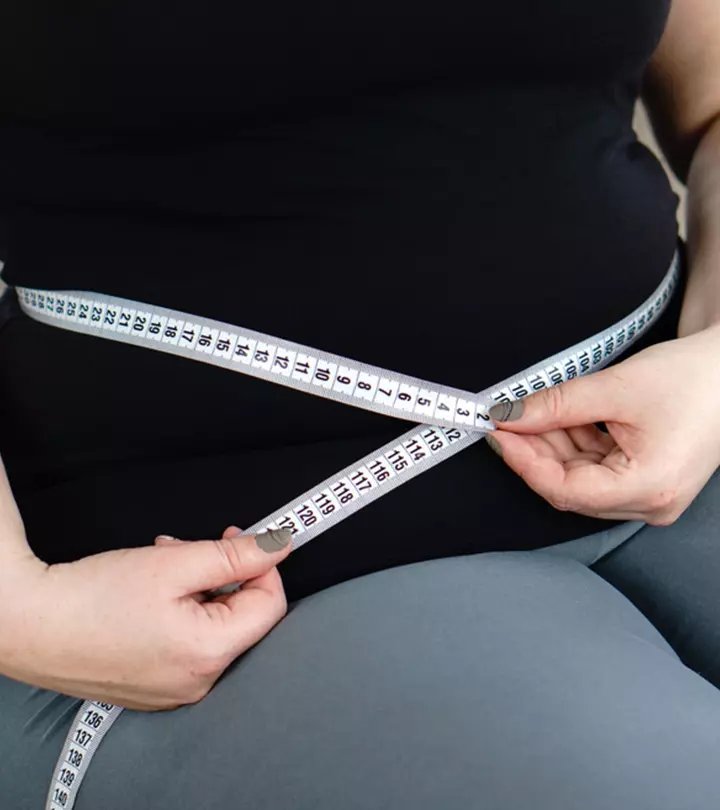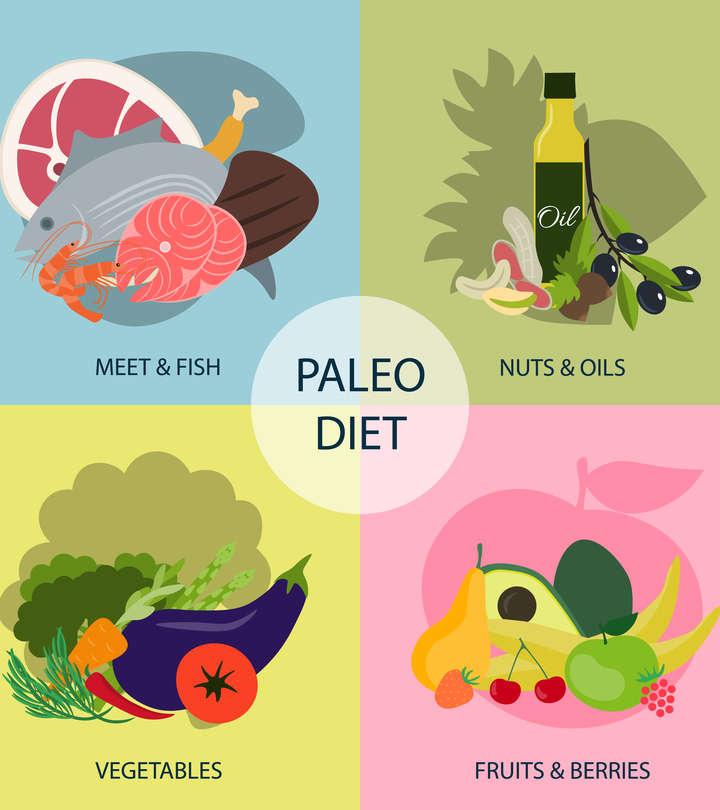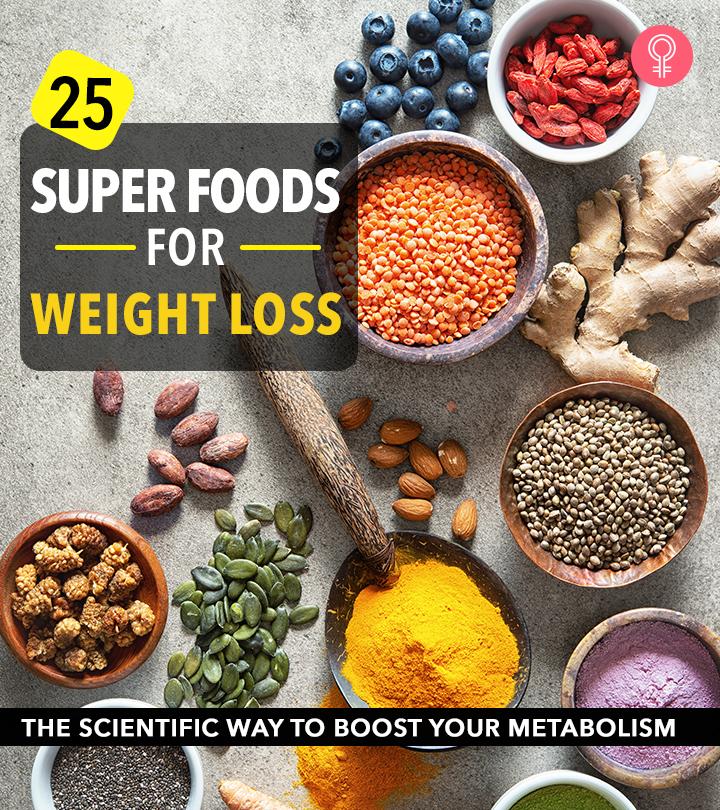How Does Stress Cause Weight Loss? 10 Tips To Control It
Relax and unwind with therapy and breathing exercises to lose weight the mindful way.

Image: Shutterstock
Can stress cause weight loss? Yes, it can. Chronic stress can cause unexplained loss of some pounds. It can affect brain function, heart health, behavior, internal organs, and immunity (1). Moreover, it can also increase the risk of tumor development (2).Hence, it is important that you listen to your body’s response to chronic stress. If you are losing weight and are constantly under stress, this post is for you. Keep reading to learn how to reduce stress and prevent unnatural weight loss.
In This Article
How Does Stress Cause Weight Loss?
Here are the various ways chronic stress causes weight loss:
- Produces Stress Hormones
When you are under constant stress, your body is constantly in the flight or fight mode. This means that you are always producing the stress hormones, adrenaline and cortisol. These hormones impact your digestion, immunity, and sleep patterns.
Adrenaline works by preparing your body for vigorous physical activity, but it also reduces your appetite. Cortisol acts by suppressing certain body functions that are unnecessary during stressful situations, like the reproductive function, digestion, and immunity.
- Affects Hunger And Digestion
Due to the dual hormonal effect on your body, you might not feel hungry often or at all. Stress affects your vagus nerve, which is the nerve responsible for GI tract peristalsis. In other words, this nerve aids the movement of digested food through your gastrointestinal tract. This means that stress can affect your digestion, and in turn metabolism. Besides this movement, the vagus nerve also affects digestion and absorption of food. Under stress, your digestive system may malfunction and cause GI inflammation and symptoms like diarrhea.
Elizabeth McLeod, a certified personal trainer and fitness blogger, shares an emotionally stressful period in her life when she lost unbelievable amounts of weight. She writes, “I didn’t eat because I was experiencing a volatile cocktail of stress and grief like I’d never known before. After my pants almost fell off in front of a crowd of people, I ‘came to’ and decided maybe it was time to check in with my weight (i).” She discovered that she had lost 34 pounds in three months, which initially made her happy. However, she eventually came to the realization that her eating patterns were unhealthy and needed to love her body more.
- Burns Calories
Under stress, you can also burn extra calories by nervously moving some part of your body – like tapping your feet or clicking your fingers. You might also feel the need to get rid of the stress by working out and end up over exercising, which can lead to unwanted weight loss.
- Affects Sleep
Stress can also affect your sleep patterns. It makes it hard to fall asleep causing sleep deprivation. In turn, disrupted sleep can make you feel sluggish and fatigued all the time. Not to mention that sleep loss over time can cause an increased production of cortisol.
 Quick Tip
Quick TipNow it makes sense why you are losing all that weight, right? But there’s one more thing you must know. Scroll down to find out.
A survey was conducted on 4,535 adults in the United States to see the effect of stress on weight. The survey found that 32% gained weight during stress while 20% of adults lost weight during stress. Out of the 20% who lost weight during stress, 18 were male and 21 were female.
Anxiety Causes Weight Loss
Forty million American adults are affected by anxiety (3). And anxiety can also be triggered by chronic stress. The hormonal imbalance (caused by stress, adrenaline, and cortisol) gets triggered when you are super anxious, thereby opening the gateway for more stress.
If you have ever paced up and down, felt a dull pain in your chest, bitten your nails without even realizing it, or got up in the middle of the night drenched in sweat, you know what I am talking about.
Anxiety and stress go hand in hand. It always helps to be aware of the triggers that cause you to become anxious and stressed out. We will discuss what to do when you are stressed out in a bit. Let’s first check out some more symptoms so that it is easy for you to understand if you are losing weight due to stress.
Symptoms Of Weight Loss Due To Stress
- Fatigue
- Difficulty falling asleep
- Digestive issues
- Body ache
- Tense neck muscles
- Frequent mood swings
- Palpitation
- Decreased sex drive
- Slowed brain function
- Loss of appetite
- Need to do a task obsessively and repeatedly
- Biting nails or lips
- Tapping feet
- Dilated pupils
 Quick Tip
Quick TipIf you display more than one of these symptoms, we can help you. Try the following ways to reduce stress and prevent unexplained weight loss.
10 Tips To Control Weight Loss Due To Stress
1. Identify The Trigger
The first step to reducing stress is accepting that you are under stress and identifying the triggers. What is stressing you out? Work? Your relationship? Finances? A memory from the past? Once you acknowledge what is causing you to get stressed, you will be in a better position to address the problem.
2. Breathe!
You will save a lot of time and energy just by focusing on your breathing. Close your eyes softly and start breathing in slowly. Feel the cold air entering your nostrils and into your windpipe. Count 1-5 and exhale slowly. Feel your chest moving down and the chest pain reducing a little. Do this 10 times every time you know that you are stressed out, and you will feel calmer immediately.
3. Write Down How You Feel
The next step is to acknowledge your feelings. Are you feeling hurt? Angry? Worried? Write all your feelings down and mention what or who is causing you stress. Just like talking to a friend, your journal can help you vent out the negative emotions from your system and make you feel lighter.
4. Seek Help
It’s OK to seek help when you need it. Your strength lies in giving your body and soul the relief that they deserve. Talk to a professional or a friend. Slowly, you will start to develop an outside perspective that will help you manage your stress.
5. Eat In Small Quantities
Many people struggle with emotional eating, but it’s also possible that you might not feel hungry at all when you feel stressed, which is why we recommend you consume small quantities of food during such periods. It is going to be tough taking even a bite, but trust the process. Equip yourself to get back up, find your ground, and stay put. For that, you need a human being’s basic need – food! Eat just a little or make a juice or smoothie and drink it. You will slowly start getting back to your normal food habits.
6. Post-Workout Nutrition Is A Must
If you work out regularly and have been working out even more to get rid of stress, you must start drinking a post-workout smoothie to prevent unwanted weight loss. A post-workout drink will help replenish the electrolytes, proteins, and carbs that your body needs to recover from the workout. Start with a small quantity and then get to drinking a tall glass of a post-workout smoothie.
7. Start Learning A New Skill
Learning a new skill can help reduce stress. Learn what you always wanted to do because there’s no better time than now. Learning stimulates the brain and keeps it occupied. You will also meet new people and develop a different outlook on life.
8. Make New Professional Connections
Work and professional life can be stressful. Make new professional connections, but not necessarily from the same field. Sometimes, it is from various kinds of discussions that you might bump into a great idea that you can actually implement and that would show great results. Talking about something totally different from your profession can help you widen your professional network as well as your ability to think beyond what you already know.
9. Hydrate
Drink water and freshly pressed juices. Hydration is as important as food. Drinking water or juice will help flush out the toxic build-up and restore your body and brain functions. Add some mint leaves and cucumber slices to add a punch to the water. You will definitely start feeling better in no time.
10. Compartmentalize
One of the most important points to deal with stress is learning how to compartmentalize. This means to separate work problems from family life and vice versa, for example. This is because if you have a dwelling problem at your workplace and come home thinking about it, you will not be able to enjoy your time with your family or yourself. Yes, it can be difficult to do and will need practice. Try writing down what you need to do for the day and check those boxes when you finish those tasks. That way, you will remain focused on your work or on spending time with family.
Controlling stress is important if you want to prevent weight loss. However, the side effects of stress are not limited to weight fluctuations only. Learn how it impacts your health in the long run below.
Long-Term Effects Of Stress And Anxiety
- Chronic stress and anxiety can raise your blood pressure and increase the risk of heart attacks and strokes (5).
- Prolonged stress can weaken your immune system due to raised cortisol levels. This can make you prone to infections and illnesses (6).
- A disturbed mind can affect your digestion and interfere with your bowel movement by messing with the gut-brain axis. It can lead to digestive issues, such as irritable bowel syndrome (IBS) (7).
- Some people may end up gaining weight due to chronic stress. Stressful eating or night eating habits can lead to excessive weight gain and obesity (8).
Infographic: Stress And Weight Loss
Stress can take a toll on not only your mental health but also your physical health. It may get to a point where you start losing weight very quickly. Fortunately, you can do certain activities to relieve stress and put an end to your drastic weight loss. Check out the infographic below to learn what you can do to relieve stress. Illustration: StyleCraze Design Team
Stress and weight loss are interconnected. However, this unexplained weight loss is unhealthy and may negatively affect overall health. Stress can negatively impact hunger. It also burns calories and affects sleep due to the high cortisol production. Anxiety also triggers stress and may eventually lead to weight loss. Fatigue, body aches, frequent mood swings, dilated pupils, and slowed brain function are the major symptoms of weight loss due to stress. Hence, identifying the stress triggers and knowing how to manage them can help treat stress and the associated weight loss.
Frequently Asked Questions
Can depression make you lose weight?
Chronic depression may often lead to lack of appetite and irregularities in diet and sleep patterns, leading to improper nutrition intake and weight loss.
Does overthinking burn calories?
While you need the energy to think, it is negligible and doesn’t burn as many calories to result in weight loss.
Can stress make it difficult to gain weight?
Yes. Gaining weight might be tough when under stress. The hormonal balance and metabolism of our bodies are both impacted by stress, which can influence our appetite and energy intake and prevent us from gaining weight (8).
Are there any psychological reasons why stress can lead to weight loss?
Yes. When someone is anxious or depressed, they could lose their appetite or find it difficult to eat, which can lead to weight loss (9).
Can stress cause a loss of muscle mass and contribute to weight loss?
Your body may create less testosterone if you have too much cortisol in your system, and this can lead to a decrease in muscle mass (10), (11).
Are there any long-term consequences of stress-related weight loss?
Yes. Stress-related weight loss can result in malnutrition and a weakened immune system if it lasts for a long time since the body is not obtaining the nutrients it needs to sustain its functioning (12), (13).
Are there any recommended dietary changes to combat stress-related weight loss?
Eating a balanced diet, staying hydrated, limiting caffeine and alcohol intake, and aiming for small portion sizes may help combat stress-related weight loss.
When should I seek medical help for stress-related weight loss?
If you are experiencing significant weight loss or other stress-related symptoms like fatigue, anxiety, or depression, then you should seek medical help for stress-related weight loss.
Key Takeaways
- Stress has many underlying effects; it triggers the release of stress hormones that impact your sleep, hunger, digestion, and immunity.
- When stress or anxiety sets in, do not stop eating. Instead, eat in less quantity but at regular intervals.
- Keep yourself preoccupied with some activity or focus on acquiring a new skill. This enables you to meet new people and get a different outlook on life.
- Never let your professional problems impact your family life or vice versa. Learn to compartmentalize your personal and professional life.
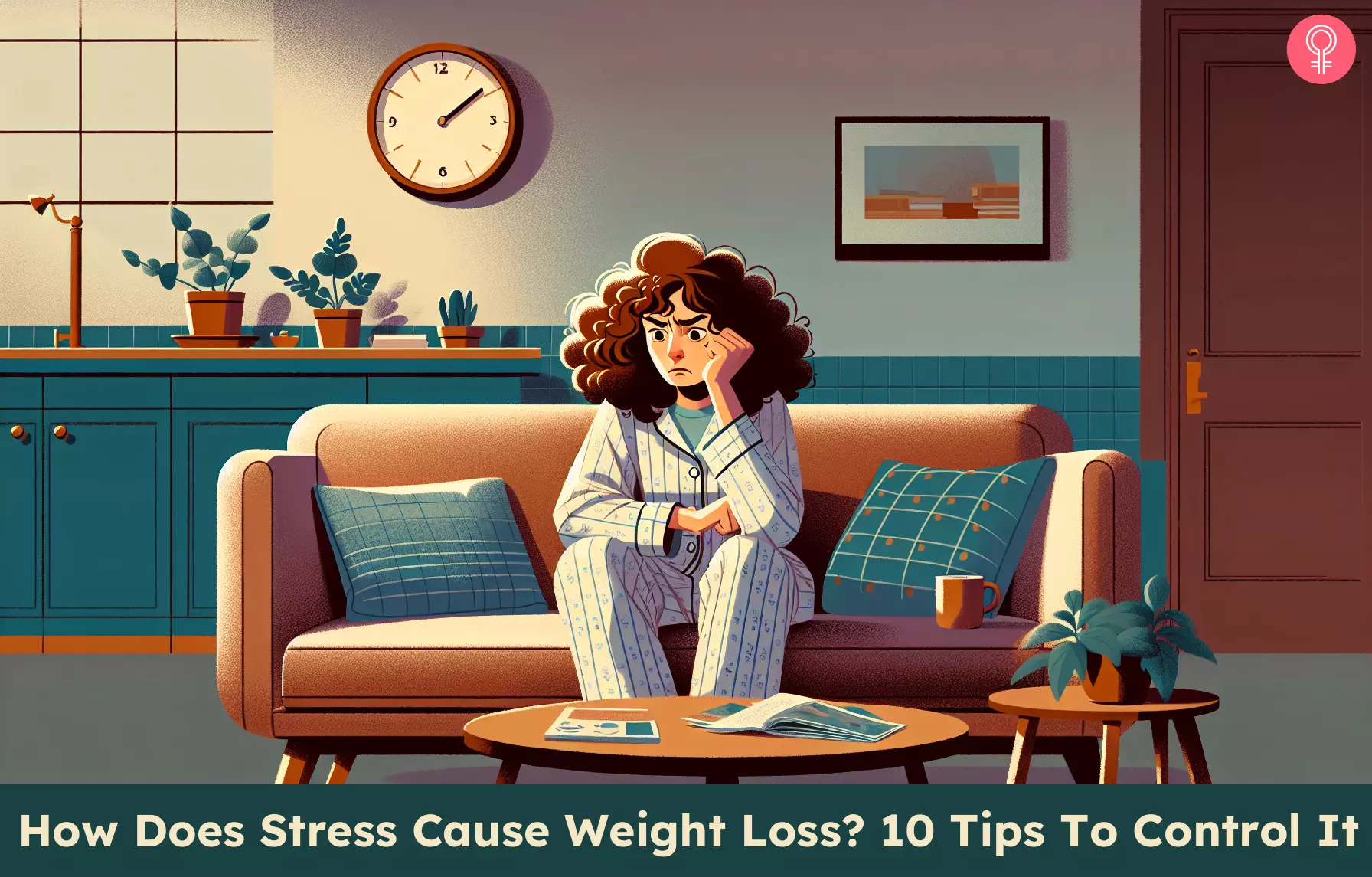
Image: Dall·E/StyleCraze Design Team
Explore the intriguing relationship between weight loss, stress, and sleep in this video. Gain valuable insights into how these factors interact and influence your weight management journey.
Personal Experience: Source
StyleCraze's articles are interwoven with authentic personal narratives that provide depth and resonance to our content. Below are the sources of the personal accounts referenced in this article.
i. Addicted to Dieting: My Storyhttps://elizabethmcleod-95158.medium.com/addicted-to-dieting-my-story-90f9932abf5
References
Articles on StyleCraze are backed by verified information from peer-reviewed and academic research papers, reputed organizations, research institutions, and medical associations to ensure accuracy and relevance. Read our editorial policy to learn more.
- The effects of chronic stress on health: new insights into the molecular mechanisms of brain–body communication
https://www.ncbi.nlm.nih.gov/pmc/articles/PMC5137920/ - Life Event, Stress and Illness
https://www.ncbi.nlm.nih.gov/pmc/articles/PMC3341916/ - Facts & Statistics
https://adaa.org/understanding-anxiety/facts-statistics - The impact of stress on body function: A review
https://www.ncbi.nlm.nih.gov/pmc/articles/PMC5579396/ - Chronic stress, exercise and cardiovascular disease: placing the benefits and risks of physical activity into perspective
https://www.ncbi.nlm.nih.gov/pmc/articles/PMC8471640/ - Editorial: Stress and Immunity
https://www.ncbi.nlm.nih.gov/pmc/articles/PMC6383636/ - The role of stress on physiological responses and clinical symptoms in irritable bowel syndrome
https://www.ncbi.nlm.nih.gov/pmc/articles/PMC3039211/ - A Review of Weight Control Strategies and Their Effects on the Regulation of Hormonal Balance
https://www.ncbi.nlm.nih.gov/pmc/articles/PMC3147122/ - Depression-related increases and decreases in appetite reveal dissociable patterns of aberrant activity in reward and interoceptive neurocircuitry
https://www.ncbi.nlm.nih.gov/pmc/articles/PMC4818200/ - Testosterone and Sarcopenia
https://www.ncbi.nlm.nih.gov/pmc/articles/PMC6119844/ - Relationship Between Circulating Cortisol and Testosterone: Influence of Physical Exercise
https://www.ncbi.nlm.nih.gov/pmc/articles/PMC3880087/ - Psychological Stress and the Human Immune System: A Meta-Analytic Study of 30 Years of Inquiry
https://www.ncbi.nlm.nih.gov/pmc/articles/PMC1361287/ - The Immune System in Children with Malnutrition—A Systematic Review
https://www.ncbi.nlm.nih.gov/pmc/articles/PMC4143239/
Read full bio of Dr. Kritika Verma
Read full bio of Ravi Teja Tadimalla
Read full bio of Aparna Mallampalli











